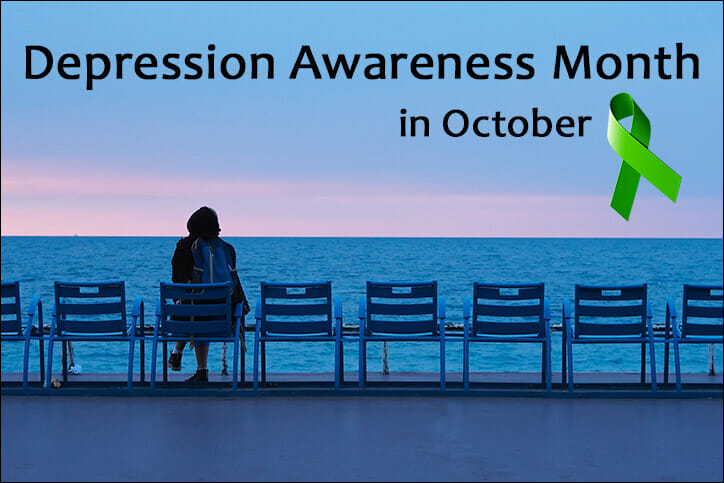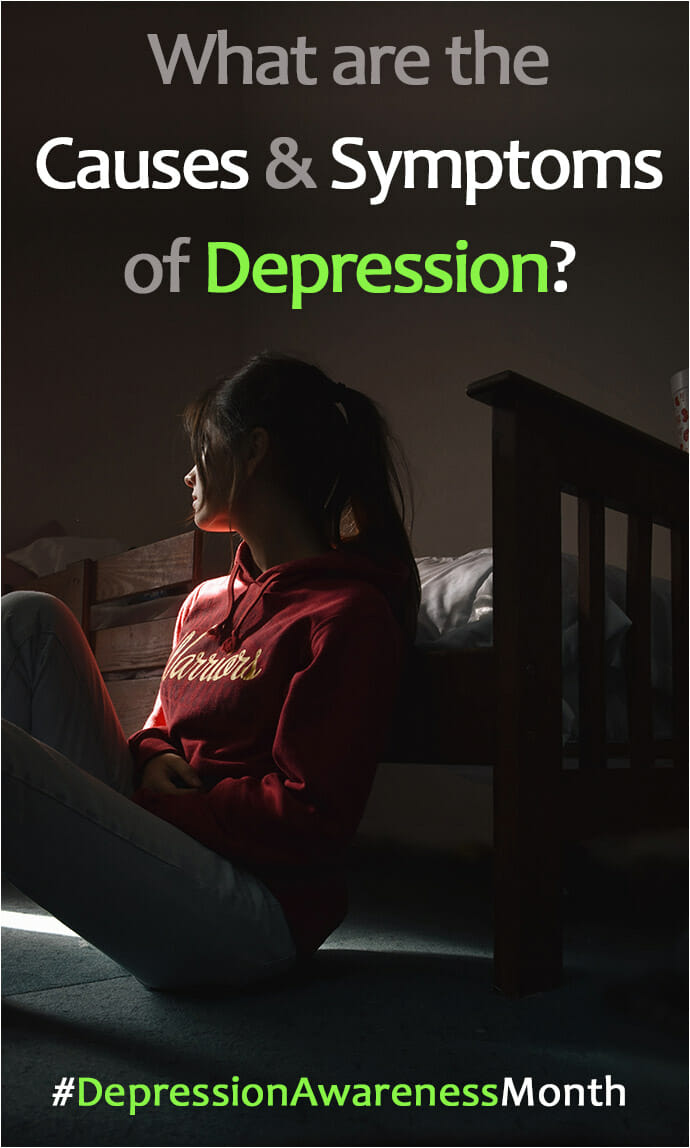Table of Contents
To raise awareness, educate, and reduce the stigma associated with mental health issues, Depression Awareness Month is observed annually in October.
Suffering from depression can be incredibly challenging. For some people it can be completely debilitating. Even a mild form of functional depression can impair a person’s quality of life and make normal, day-to-day activities seem overwhelming and stressful.
Dealing with depression is also quite common and people of all ages, races, ethnic and socioeconomic backgrounds can be affected by it.
Over the years, many famous people with depression have spoken publicly about how it affected their life and how they were able to overcome it.
Around 8 percent of the population – more than 19 million adults in the United States – struggle with a depressive episode every year, according to the National Alliance on Mental Illness.
Taking the opportunity to learn about the causes of depression, the associated symptoms, and effective treatment approaches helps those who may be suffering in silence to identify the condition and reach out for help.
It can also lead to compassion and understanding in those who have family, friends, or colleagues battling what, in some cases, can be a very serious condition.
What Causes Depression?
Research suggests that depression is caused by a combination of genetic, environmental and biological factors, though it’s still unclear why some people battle much worse symptoms than others.
Often, depression is spurred on by a variety of different life challenges. In many cases, it’s impossible to identify one primary reason for persistent and intrusive feelings of sadness and despair because there are usually many things at play.
Reasons people experience depression:
- Suffering from a serious or prolonged illness
- The death of someone close
- Life changing events that occur suddenly or without notice
- Family history of mental health issues, not limited to just depression
- Untreated alcohol or drug use dependence and addiction
- Experiencing trauma or abuse, especially if these events occurred during the formative child and teenage years
Certainly, these are all broad and somewhat general categories. In truth, everyone is different and what triggers depression in one person may not affect someone else.
Whatever the cause, the symptoms of depression are very real and can take a toll on even the strongest of people.
What are Common Signs of Depression?
Regularly practicing self-care strategies can help lessen the impact of some of the most common symptoms of depression. In order for that to be possible, however, being able to identify the onset of symptoms is key.
Unfortunately, many people don’t realize they’re suffering from depression until it has drastically affected their daily lives. With just a little bit more education, awareness, and understanding, it can be easier to see the signs early on.
Signs of depression often include:
- Changes in sleep patterns – either difficulty sleeping or sleeping far too much
- Feeling continually exhausted or fatigued
- A regular lack of energy
- Suffering from body aches and pains without good reason
- Difficulty focusing or concentrating on a single task
- Appetite changes – either eating very little or too much accompanied by a noticeable weight loss or weight gain
- Sudden loss of interest in activities previously enjoyed
- Withdrawing from family and friends
- Feelings of hopelessness or guilt
- An increase in drug or alcohol use to cope with depression symptoms
- Suicidal thoughts and ideations
Persistent major depressive disorder symptoms may be easier to identify than others, but it’s important to be aware of all the signs when they occur.
In addition, 21 percent of people who have a substance use disorder also battle depression, according to SAMHSA. In other words, both conditions can actually make the other worse.
The presence of a mental health condition, like depression, and a substance use disorder is known as a co-occurring disorder or a dual diagnosis.
Treatment for Depression During Depression Awareness Month
The good news is depression is very treatable in most cases. The key is receiving a thorough evaluation and being properly diagnosed. Once a diagnosis has been determined, a medical professional will be able to develop the most practical treatment plan.
An effective treatment approach will include treating issues like a substance use disorder alongside depression when they co-occur together. Dual diagnosis treatment is critical because if one condition is left untreated, recovery from either is made even more difficult.
Other effective treatment methods for depression include:
1. Counseling or Therapy
Counseling or psychotherapy can be very effective for treating depression and overcoming regular symptoms.
This often includes treatment approaches like Cognitive Behavioral Therapy along with one-on-one therapy and even family counseling if appropriate.
CBT can be effective for learning how to stop ruminating and replacing negative thoughts and behaviors with healthier ones.
2. Antidepressants and Medications
Antidepressants, mood stabilizers, or antipsychotic medications may be used to improve a person’s brain chemistry that causes many of the symptoms of depression.
The best approach for some people is to use antidepressant medications combined with counseling and therapy.
3. Exercise
Believe or it not, exercise is an incredibly powerful treatment tool for reducing the symptoms of depression. Getting regular exercise not only builds strength and endurance, but it helps the body work off excess stress that often leads to depression.
In addition, exercise releases feel-good neurotransmitters in the brain like endorphins, serotonin, and dopamine that help regulate and stabilize mood.
4. Healthy Nutrition
Proper healthy nutrition, meaning a diet filled with fresh vegetables, fruits, and lean proteins like fish and chicken, provide energy that doesn’t spike and then plummet, which can exacerbate many of the issues of depression.
Some healthy foods also promote serotonin and other neurotransmitters that make us feel happy and keep the blues away.
5. Alternative Activities for Depression
Alternative activities like yoga, meditation, music, and mood therapies, are effective in staving off depressive symptoms.
Alternative mood therapies like Eye Movement Desensitization and Reprocessing Therapy (EDMR) are used by some treatment centers for dramatically improving depression symptoms.
6. TMS Therapy
TMS Therapy, also known as Transcranial Magnetic Stimulation, is a safe and effective approach for treating mental health conditions like depression, anxiety, OCD, and others.
TMS for depression works especially well for treatment-resistant depression when medication and other methods have not been successful.
Recognizing Depression Awareness Month
During Depression Awareness Month, take the opportunity to learn about the many issues surrounding depression.
The first week in October is recognized as Mental Illness Awareness Week (MIAW), with the goal of raising awareness about all mental health issues, including depression.
In addition, National Depression Screening Day is observed every year on Thursday of the first full week in October during Mental Illness Awareness Week. It offers people a chance to get screened for depression symptoms.
If you’ve already overcome depression, look for opportunities to help others or spread awareness about the condition.
As always, be ready to provide resources like the National Helpline number for the Substance Abuse and Mental Health Services Administration (SAMHSA) or 1-800-662-HELP (4357) for those in need.
To show support for Depression Awareness Month, wear green or a green ribbon to let others know you care about overcoming this mental health condition.
When posting to social media, use the hashtags #DepressionAwareness or #DepressionAwarenessMonth when sharing important information to help raise awareness and make it easily found by others.
Frequently Asked Questions
When is depression awareness month?
October is depression awareness month, and it was first recognized by Mental Health America in the United States in 1994 and is now observed in many other countries. The original goal remains to this day to raise awareness for depression resources, education, and support.
When is national depression awareness day?
There isn’t a specific date recognized as Depression Awareness Day although World Mental Health Day is on October 10. Mental Illness Awareness Week is celebrated the first week in October and National Depression Screening Day occurs during that week.
What color is the depression awareness ribbon?
The green ribbon is considered the international symbol for mental health awareness, and it is also used to signify support for depression awareness.





